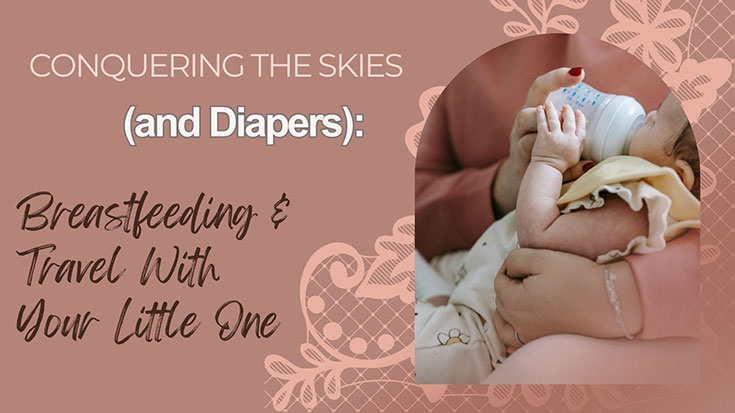A new mom, Taylor Servedio, was breastfeeding her son Leo on a plane when a flight attendant approached her with napkins saying it was illegal to breastfeed uncovered. Despite the airline’s apology and compensation, the experience left Servedio feeling humiliated and raised questions about breastfeeding rights on airplanes.
Luckily, the law and most airline policies actually protect a mother’s right to breastfeed publicly. Servedio’s story highlights the need for wider awareness of breastfeeding rights to normalize and destigmatize the practice.
Traveling with a newborn coupled with the fact you are breastfeeding presents a unique set of challenges. Concerns about milk supply, security checks, and finding comfortable nursing spots can add stress to an already adventurous journey.
However, careful planning and a positive attitude will help you and your baby conquer the skies (and the inevitable diaper changes) with ease and a few laughs!
Planning Your Breastfeeding Adventure
Remember that research is your best friend. Begin by checking out the breastfeeding policies of the airline you are traveling with — familiarize yourself. Most airlines welcome breastfeeding onboard, with some even offering designated nursing areas. The National Childbirth Trust provides a helpful guide to airline breastfeeding policies in the UK.
Packing comfortable, loose-fitting clothing that allows for easy access for nursing is a must-do. Include plenty of nursing pads to prevent leaks, and consider a lightweight nursing cover for added privacy if desired.
If you’re concerned about flight delays or turbulence impacting your milk supply, consider expressing milk beforehand and storing it in a cooler bag with ice packs. The Centers for Disease Control and Prevention (CDC) is one resource that offers guidance on safe ways to store breast milk for travel.
Navigating Security Smoothly
Breast milk is exempt from TSA liquid restrictions in the US. Inform security officers about your breast milk so they can conduct a quick screening.
Also, breastfeeding mothers need to stay extra hydrated during travel. For on-the-go hydration, bring a reusable water bottle. Security allows you to fill it up after the chec.
Comfort at Cruising Altitude
Select your seat strategically. Bulkhead seats offer extra legroom and can facilitate easier positioning while nursing. Some airlines offer designated bassinet seats for infants, which can be helpful for younger babies.
Pack familiar toys and pacifiers to keep your little one occupied, especially during takeoff and landing. A recent study published in the journal “Pediatrics” found that non-nutritive sucking (such as on a pacifier) can actually help calm infants experiencing discomfort associated with air travel pressure changes.You may want to consider carrying formula as a backup for those unforeseen circumstances. A small amount of pre-measured formula will help. However, it’s crucial to stay informed about any NEC lawsuit update that concerns certain brands.
Organizations like ‘The American Academy of Pediatrics (AAP)’ and TorHoerman Law recommend consulting your pediatrician for guidance on safe and reputable formula brands, particularly in light of ongoing legal developments related to NEC (Necrotizing Enterocolitis).
Beyond the Basics
Feeding moms need their village. Many airports offer designated lactation rooms, providing a private and comfortable space to nurse or express milk. Check with your airline or airport website to identify such locations.
You can take the help of mobile applications like “Mamava” to help you locate lactation facilities on the go. Recently, Burlington Airport upped its family-friendly game by adding a high-tech lactation pod from Mamava, the third at the airport. This wheelchair-accessible pod offers comfy seating, outlets, a mirror, and even fridge space. Bonus: it’s mobile! They also unveiled a lactation bench for casual feedings.
Try to embrace flexibility during your travel. Babies thrive on routine, but travel can disrupt schedules. Be prepared to adjust feeding times as needed and remain patient.
Ask flight attendants or fellow passengers for help with anything you need. Most people are understanding and happy to help a new mom in need.
Frequently Asked Questions (FAQs):
Can I Bring Breast Milk Pump Supplies Through Security?
Absolutely! Breast pump supplies clear security checks at most airports. However, it’s always a good idea to double-check the country’s website or your chosen airline’s policy for any specific guidelines. Pack pump supplies in a separate bag/compartment in case you need to access them for a security check. The officer may request a visual inspection of the equipment.
Can I Keep My Breast Milk Even If It Gets Warm?
The CDC advises discarding warm breast milk — your cooler bag may no longer be effectively chilling it. Breast milk can harbor bacteria growth at warmer temperatures. The good news is that you can always express fresh milk after landing. If the length of your delay concerns you, consider hand expressing or using your pump in a designated lactation space at the airport.
What if My Baby Refuses to Breastfeed on the Plane?
Try recreating a familiar nursing environment – use a nursing cover or find a quieter spot on the plane. Dimming the cabin lights might also mimic a bedtime routine and encourage calmness. If these tricks don’t work, ask flight attendants for help. They are trained to assist passengers with young children, and they may have additional suggestions.
Wrapping up, a 2023 study published in the journal ‘Breastfeeding Medicine’ found that 87% of mothers reported successfully breastfeeding their babies during air travel.
If you do have trouble despite these tips, lactation consultants are healthcare professionals who can help. Through education and positive counseling, they boost confidence and overcome challenges.
Postpartum conditions like depression can subtly hinder breastfeeding. Try to identify and address these issues. Ideally, lactation consultant support is made available both during hospitalization and after discharge.
You’re ready to conquer this journey and have a great time while at it. Reaching out to another breastfeeding mom on board can also be a great resource – they might have some tips or simply offer support and understanding! Happy travels to you and your family.







Speak Your Mind